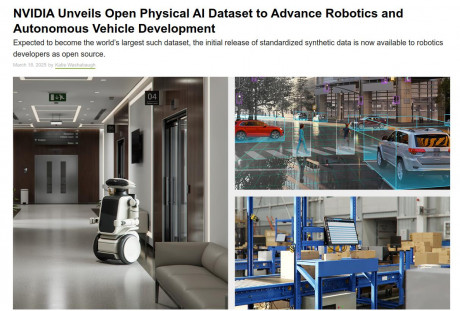Gefion: Denmark's NVIDIA-Powered AI Supercomputer
Denmark has made headlines with the launch of Gefion, a powerful AI supercomputer built on the NVIDIA DGX SuperPOD.

Image: Nvidia's blog screenshot
The project was celebrated at an event in Copenhagen where Denmark's King Frederik X, Jensen Huang, CEO of NVIDIA, and Nadia Carlsten, CEO of DCAI, turned on the system. Gefion is now set for a pilot phase, offering select users a chance to explore its potential across fields like quantum computing, drug discovery, and solutions for societal challenges like the shift to green energy.
“Gefion provides our Danish enterprises with entirely new opportunities,” said Morten Bødskov, Denmark's Minister for Industry, Business, and Financial Affairs. According to him, the supercomputer will strengthen Denmark's competitive edge globally and aid in the green transition by enabling customized solutions and promoting innovation.
Gefion is a collaborative effort between the Novo Nordisk Foundation, which invested DKK 600 million, and the Export and Investment Fund of Denmark (EIFO), which contributed DKK 100 million and holds a minority 15% stake. The newly established Danish Centre for AI Innovation A/S (DCAI) owns and will run the supercomputer. Nadia Carlsten of DCAI highlighted the rapid build time of only six months and the significance of having such a game-changing capability ready for researchers and businesses.
This AI powerhouse is powered by 1,528 NVIDIA H100 Tensor Core GPUs and features NVIDIA Quantum-2 InfiniBand networking. Until now, Denmark lacked GPU-accelerated supercomputers, making Gefion a leap forward for the nation’s AI-based research, which has faced limitations due to insufficient computing power. Digital Realty, a data center provider, hosts Gefion in a sustainable facility running on 100% renewable energy, and Eviden managed the setup with its HPC expertise.
Jensen Huang pointed out that Denmark’s investment in domestic AI infrastructure is essential for fostering innovation. Gefion’s arrival paves the way for advancements in life sciences, climate research, and quantum computing, among other areas.
One of the first tasks for Gefion includes projects from winners of a competition that received over 50 proposals in three weeks. These projects, led by institutions such as the University of Copenhagen and startups like Teton and Go Autonomous, aim to leverage Gefion’s power to tackle complex data challenges. The Danish Meteorological Institute will also use it to enhance weather forecasting, processing extensive data in real time for faster, more precise outcomes.
The presence of Gefion has implications for Denmark’s role on the global AI stage. As the country harnesses its own resources and data, it mirrors strategies seen in other sectors where sovereignty ensures direct benefits. But the question remains: will the trend toward national AI infrastructure encourage global collaboration or drive countries towards competition?
Gefion is a bold move that represents Denmark's strategic push into an AI-driven future, where new possibilities meet challenges. How other nations respond to this kind of development could redefine global AI dynamics.
Last modified 06 November 2024 at 10:08
Published: Nov 4, 2024 at 3:29 PM


